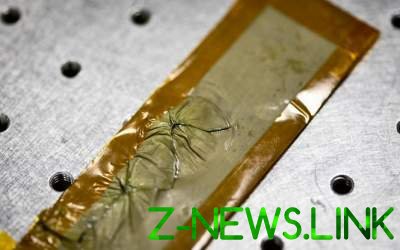 The battery continues to work after injury.
The battery continues to work after injury.
American researchers have developed a battery that continues to supply power even when its hit with a hammer or thrown into the water.
The work is more safe and durable batteries based on the new aqueous electrolyte, which was developed in 2015 at the University of Maryland.
A new development is the solution to the problem of safety in the operation of lithium-ion batteries which, if improperly exploited, and that, for unknown reasons, could explode.
“We are very excited with the results, and are close to fully test specimens in the field,” says Jeffrey Marani, program Manager for materials science at the applied physics Laboratory of Johns Hopkins University.
Through the development of safer and more durable battery is a new aqueous electrolyte. It solves a key issue associated with the use of water in Li-ion batteries: a low threshold of electrochemical stability of about 1.2 volts. Extending this threshold to 3 volts, the water in salt produces a much higher energy density in lithium-ion batteries.
A team of scientists has built the electrolyte based on the salt in polymer matrix of polyvinyl alcohol, forming a gel polymer electrolyte. This form of the electrolyte is more stable than the liquid form, which allows the use of a flexible battery which can be twisted and folded.
The researchers used flexible lithium-ion battery to produce electricity in the open air with minimal packaging, using only heat-resistant insulating tape to keep the flexible battery integrity.
During operation of the battery, the researchers sliced it, dipped in sea water and subjected to a powerful distorting impact. The battery has not exploded, ignited, and continued to operate the fan even after mechanical damage and exposure to the air and water.
© 2017 – 2019, paradox. All rights reserved.





